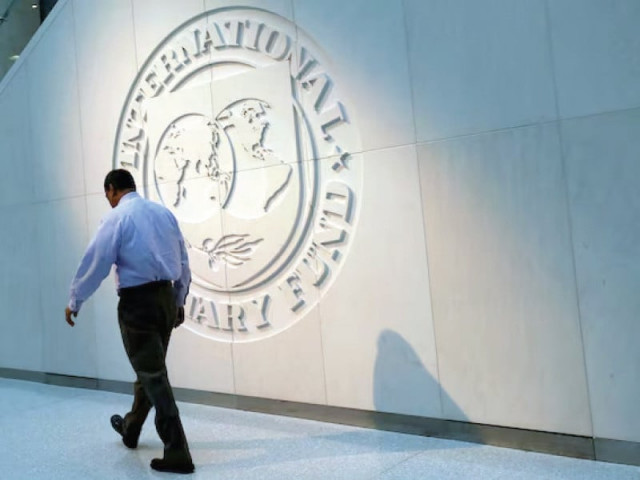Islamabad seeks $8 billion IMF loan under EFF
Higher amount of lending comes with tougher conditions

Pakistan has requested the International Monetary Fund to extend an $8 billion loan package in a bid to fully avail its remaining maximum quota under the new Extended Fund Facility — a sum that is around $2 billion higher than what the global lender has so far offered.
The sources said that in addition to implementing multiple prior actions, issues related to the size of the new bailout package and any new loan by the traditional three bilateral creditors remained open for discussions.
The Pakistani authorities have sought around $8 billion under the EFF in addition to any financing that the government can get under the Resilient and Sustainability Facility (RSF), according to the sources. They said that the IMF was inclined to give a $6 billion deal, subject to the fulfilment of all the conditions.
Pakistan’s quota in the IMF stands at 2.03 billion Special Drawing Rights (SDRs) or $2.7 billion. A country can get a maximum of 435% of the quota, which translates into $11.7 billion. However, Pakistan has already availed $3.3 billion from the IMF under the previous deals and its remaining quota is around $8.4 billion.
The sources said that the finance ministry wanted to avail almost the entire remaining quota but the IMF has so far indicated to give $6 billion.
The higher amount of lending to Pakistan will attract tougher conditions, which the IMF has already prescribed during the May 10th to 23rd staff visit to Pakistan.
One of the conditions for the new loan programme is to take additional revenue measures equal to 1.6% of the GDP or Rs2 trillion, according to the sources.
The Ministry of Finance spokesman did not respond to a request for comment on the question of the size of next year’s bailout package. However, a senior ministry official said that the country has sought an $8 billion deal and the final decision will be made by the IMF management.
A finance ministry official said that in case Pakistan gets the maximum of the remaining quota, it will have to pay an additional surcharge of 2% over and above the standard interest rates applicable on the EFF programme.
Pakistan has huge financing requirements for the next fiscal year, which no single creditor can meet. The IMF also mentioned in its press release that "The mission and the authorities will continue policy discussions virtually over the coming days aiming to finalize discussions, including the financial support needed to underpin the authorities’ reform efforts from the IMF and Pakistan’s bilateral and multilateral partners."
The PML-N government has taken a principled decision that it would no longer make a request for any new cash deposit loan from the traditional bilateral creditors – a cabinet member told The Express Tribune on condition of anonymity.
Prime Minister Shehbaz Sharif had publicly said in the United Arab Emirates last month that Pakistan would no longer seek a bilateral loan and has broken the "begging bowl".
Saudi Arabia, the United Arab Emirates, and China have already placed $12 billion in cash deposits with the central bank and $5 billion of that is maturing in July this year.
The IMF mission returned to Washington last month without signing a deal, linking the final agreement with prior discussions in the IMF board. The IMF said in a press release that it would present the mission findings to the IMF Board for discussion and a decision.
During a first briefing to the Pakistan Peoples Party leadership on the conditions set out by the IMF, Finance Minister Muhammad Aurangzeb claimed that the signing of the staff-level agreement would not require any prior approval of the board.
The government had briefed the PPP leadership about the conditions by the IMF for the new bailout package, which include approval of the budget, increase in electricity and gas prices, signing of National Finance Pact (renegotiation of the NFC), and prior approval of the supplementary grants by the Parliament.
The sources said that the IMF has also imposed a condition that the four presidential ordinances that had been promulgated in December under the last $3 billion IMF programme should now be approved by parliament.
The laws had been made to improve governance in four government-owned entities. Pakistan will be required to get the approval of the Parliament of the National Highway Authority (Amendment) Ordinance 2023, Pakistan Postal Services Management Board (Amendment) Ordinance 2023, Pakistan National Shipping Corporation (Amendment) Ordinance 2023, and Pakistan Broadcasting Corporation (Amendment) Ordinance 2023, according to the government sources.
The IMF got these laws implemented to separate the positions of chairpersons and chief executives in NHA, Pakistan Post, PNSC and PBC. The Ordinance has a maximum life of eight months.
The amendments have been made to bring the entities in conformity with the State Owned Enterprises (Governance and Operations) Act, 2023, promulgated in January.


1724319076-0/Untitled-design-(5)1724319076-0-208x130.webp)
















COMMENTS
Comments are moderated and generally will be posted if they are on-topic and not abusive.
For more information, please see our Comments FAQ